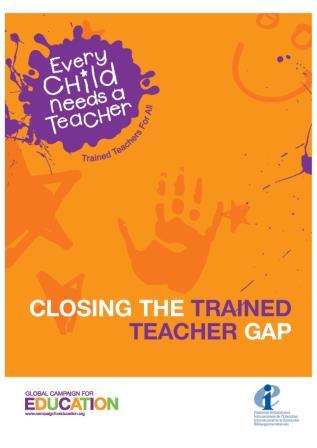GAW 2013 | Leerkrachten
‘Every child needs a teacher’
Het grote tekort aan leerkrachten zorgt ervoor dat miljoenen kinderen niet naar school kunnen. Maar als kinderen wel naar school gaan, betekent het nog niet dat ze goed onderwijs krijgen en echt iets leren. Soms zijn de klassen door het gebrek aan leerkrachten overvol, en soms hebben leerkrachten zelf nauwelijks onderwijs gevolgd. Vandaar dat 250 miljoen kinderen niet kunnen lezen en schrijven, ook al zijn ze enkele jaren naar school geweest.
Enkele voorbeelden:
- In Mali heeft slechts de helft van de leerkrachten die lesgeven in het basisonderwijs een lerarenopleiding gevolgd. Voor driekwart van hen duurde die opleiding korter dan een half jaar.
- In Niger zijn 1,4 miljoen kinderen die lager voortgezet onderwijs zouden moeten volgen. Er zijn echter slechts iets meer dan 1.000 opgeleide leerkrachten voor hen. Dat betekent dat elke van hen zo’n 1.300 kinderen zou moeten lesgeven.
- In sommige landen ben je al een ‘opgeleide leerkracht’ als je na de basisschool een maand training hebt gehad.
- 31 Landen melden dat meer dan driekwart van de leerkrachten ‘niet opgeleid’ is volgens de nationale opleidingseisen.
Reden om in de Global Action Week van 2013 te benadrukken hoe belangrijk de rol van een goede leerkracht is voor het onderwijs.


Closing the trained teacher gap
In het rapport ‘Closing the Trained Teacher Gap’ wijzen GCE en Education International op het grote tekort aan goed opgeleide leerkrachten. Wat betekent dat voor het onderwijs, en hoe kunnen we het oplossen?
Waar de GCE zich in 2013 sterk voor maakt
Over de hele wereld zetten nationale GCE-coalities zich in om overheden aan de internationale afspraken te houden. Soms in goed gezamenlijk overleg, soms door petities en politieke lobby, soms met gedegen rapporten, soms met vrolijke publieksacties. Veel acties spitsen zich toe op de wereldwijde actieweek, de Global Action Week for Education (GAWE). Maar ook in de rest van het jaar werkt de GCE-beweging aan het thema van 2013.
Overall demands...
- Standards: governments and their international partners must recognise the necessity for professionally trained, qualified, supported teachers, and develop policies and standards for teacher recruitment, training, development, salaries and conditions that reflect this.
- Planning and reporting: governments must develop costed plans to fill the gap in trained teachers and ensure that the plan addresses disparities between regions, in rural and remote areas and report publicly on progress against these plans and on the Pupil-to-Trained-Teacher Ratio (PTTR); donors should publish and report on their planned contribution to filling the trained teacher gap.
- Finance: governments must develop and implement budgets that will ensure that the trained teacher gap is filled – including necessary recruitment, training and professional-standard pay; donors should allocate at least 10% of their ODA to basic education and provide more aid through predictable, long-term budget support.
International institutions....
The Global Partnership for Education should…
- Provide coordinated financing and other support to the expansion of a well-trained, professional teacher workforce, explicitly recognizing the significance of this for learning outcomes and quality education.
- Ensure that the teaching profession, through teacher organisations, is involved in the development and implementation of national education plans submitted by governments to GPE.
The World Bank should…
- Meet its original 2010 pledge of additional funding for basic education, by providing at least $6.8 billion for basic education in IDA countries between 2011 and 2015, and an increase in funding for sub-Saharan Africa.
- Refrain from providing advice or conditionality such as SABER that limits the professional status, training, pay or unionisation of teachers, or that encourages high-stakes testing.
- Publish its intended contribution to tackling the teacher crisis and lowering Pupil-to-Trained-Teacher ratios, and report annually on progress against this plan.
- Ensure that the teaching profession, through teacher organisations, is involved in the development and implementation of the plans for which it provides financial support.
The IMF should:
- Work with governments and other key education stakeholders such as teacher organisations and other civil society groups to develop macro-economic frameworks that support the significant expansion of investment in teachers.
- Expand its work on social spending floors to include support for governments on tracking investment in teachers.
National governments should...
- Develop costed workforce plans, agreed with parliaments, teacher organisations and civil society, to meet the full gap in trained teachers and deploy those teachers equitably. (In emergency or post-conflict situations, develop transition plans to move towards these targets, in agreement with national stakeholders.)
- By 2014, measure and publish the Pupil-to-Trained-Teacher ratio, overall and in the public sector, (according to standards of training as indicated above), including regional variations. This should be included in reports to the Committee on Economic, Social and Cultural Rights (CESCR).
- Develop and enforce high national standards of training, developed with the teaching profession, through collaboration with teacher organisations, in reference to international standards.
- Ensure initial pre-service training for all new recruits to teaching that covers subject knowledge, pedagogy and training in diagnosis of students’ learning needs and based on consultations of teacher organisations, with sufficient time to develop these skills; raise the ISCED level of teacher training by at least one level over the next three years.
- Undertake a gender review of national Education Sector Plans, and develop long-term strategies to recruit, train, support and compensate women teachers.
- Provide ongoing in-service training and professional development for all teachers, making use of communities of practice and following up on training given.
- Ensure that all teachers are being paid a decent, professional wage, negotiate and agree pay scales with teacher unions, do not use pay as a system of individualised punishment and reward based on high-stakes testing or other ‘merit’ pay.
- Strengthen school leadership and promote the establishment of school management committees led by teachers and include, teachers, parents and local community members.
- Promote adult literacy programmes
- Support the establishment of Teaching Councils, involving representatives of teacher organisations, to develop and enforce professional standards and ethics.
- Allocate a minimum of 20 percent of national budgets, or 6 percent of GDP, to education, and ensure that at least 50 percent of this is dedicated to basic education, with a much higher percentage where necessary.
- Focus a considerable proportion of financing for post-secondary education on the development of high quality teacher training programmes.
- Progressively expand the domestic tax base, for example through setting a fair rate of corporation tax and not offering unnecessary tax holidays.
- Pursue expansionary macro-economic policies which allow greater investment in quality public services, resisting the imposition of austerity policies by the IMF or other advisers.
- Open planning and budgeting processes to teacher organisations, and other civil society organisations, for example through participation in official government-partner groups in the education sector (e.g. Local Education Groups).
- Report regularly and transparently on budgets and spending in education, making clear the allocations to district/province and local level, so that spending can be tracked by communities and civil society organisations.
Private donors should...
- Support national strategies to develop the professional teacher workforce for public education by, for instance, contributing to pooled funds that support national education sector plans.
Bilateral donors should...
- Meet their commitment to spend at least 0.7 percent of GNI on aid.
- Realign ODA to commit at least 10% to basic education, including contributions to the GPE and a proportion of budget support.
- Provide a greater proportion of ODA as general or sectoral budget support.
- Ensure all aid for education is aligned with national education plans by providing financing through a pooled fund that supports the national education plan.
- Ensure all bilateral interventions in education allocate a significant part of financial support to activities tackling the trained teacher gap.
- Develop and publish a plan setting out contribution to tackling the teacher crisis and lowering Pupil-to-Trained-Teacher ratios, and report annually on progress against this plan.
- Ensure that the teaching profession, through teacher organisations, is involved in the development and implementation of national education plans or bilateral projects they support.
- Engage with and support the International Task Force on Teachers for EFA.
